Perfectly Roasted Char Siu Pork, Straight from Mom’s Kitchen.
Char siu, the iconic bright red Cantonese-style roasted BBQ pork, is one of my all-time favorite Chinese dishes. I’d argue that it’s pretty hard not to love char siu (it’s absolutely delicious!), but I’m particularly fond of it since it reminds me of my Mom. Mom makes char siu at home pretty regularly – it’s a staple ingredient in many of our favorite meals.
Due to its uniquely spiced-yet-sweet flavor (& its intense red hue!), I always assumed char siu pork must be pretty complicated to make. It was a pleasant surprise to learn that’s not necessarily true! This particular recipe is my Mom’s – we’re really excited to finally share it here on PWWB.
It all starts with a quick marinade made from just a handful of pantry staples like soy sauce, Chinese five spice, & dark brown sugar (a nod to Mom’s Chinese-Hawaiian roots!). Once the pork has soaks up the marinade, it’s simply oven-roasts until it’s juicy & meltingly tender, with beautifully caramelized-crisp edges.
It seriously is so quick & simple to make, but the absolute best thing about char siu pork is how versatile it is. It’s great when you serve it all on its own, but it’s also an amazing add-in for stir fries, noodle dishes, ramen, & so much more. I have a feeling that you’re going to love it just as much as we do!
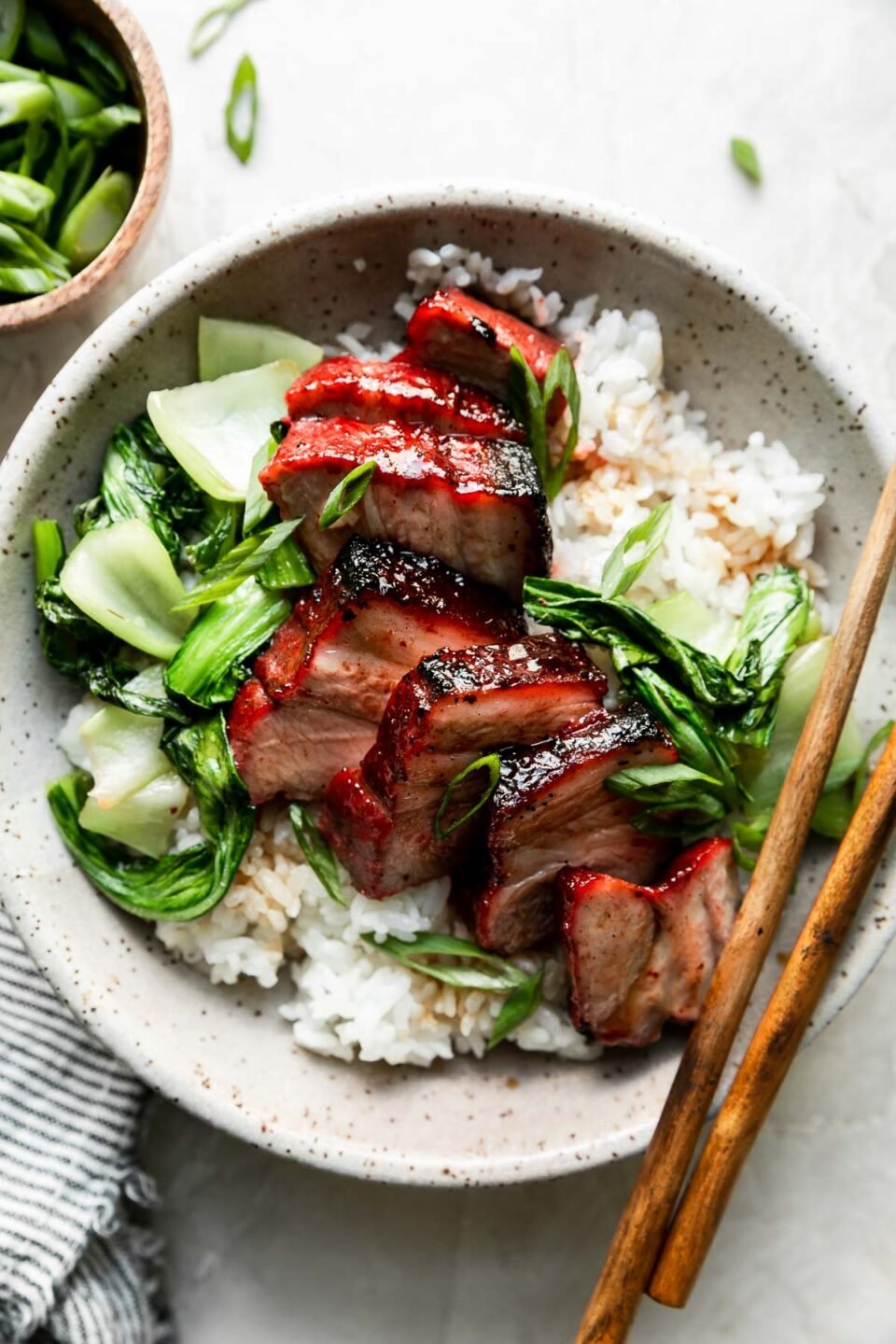
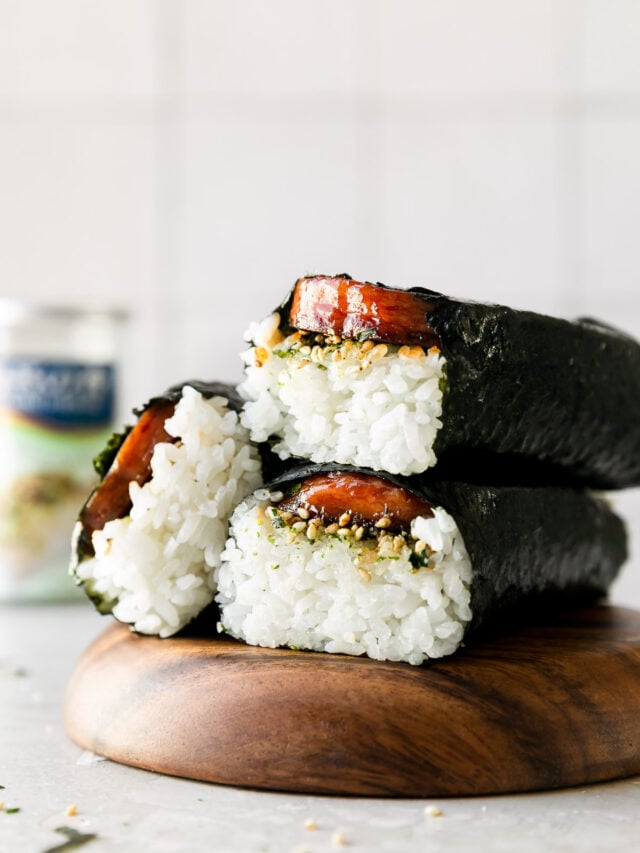
FREE Email Series: Local-Style Hawai’i Favorites
16 of my family’s recipes delivered straight to your inbox for a true taste of aloha at home! 🌺🤙🏼
Easy Homemade Char Siu Recipe Overview
You will LOVE this easy homemade Chinese BBQ pork because it’s…
- INSANELY FLAVORFUL. A char siu marinade made of simple pantry staples infuses pork shoulder with tons of flavor. Combine the epic sweet-yet-spiced flavor with the crisp & caramelized texture & you’ll see why we’re completely obsessed with this roasted pork.
- NO-FUSS. My family’s recipe only uses 4 staple ingredients & is mostly completely hands-off while the pork marinates & roasts. So simple!
- ENDLESSLY VERSATILE. You can eat char siu pork on its own with a warm pile of rice or add it to other iconic dishes like steamed bao buns, a bowl of ramen, or fried rice.
Life truly doesn’t get better than at-home char siu! ♡ Read on to learn more about how to make Mom’s Easy Homemade Char Siu Pork, or jump straight to the recipe & get cooking!
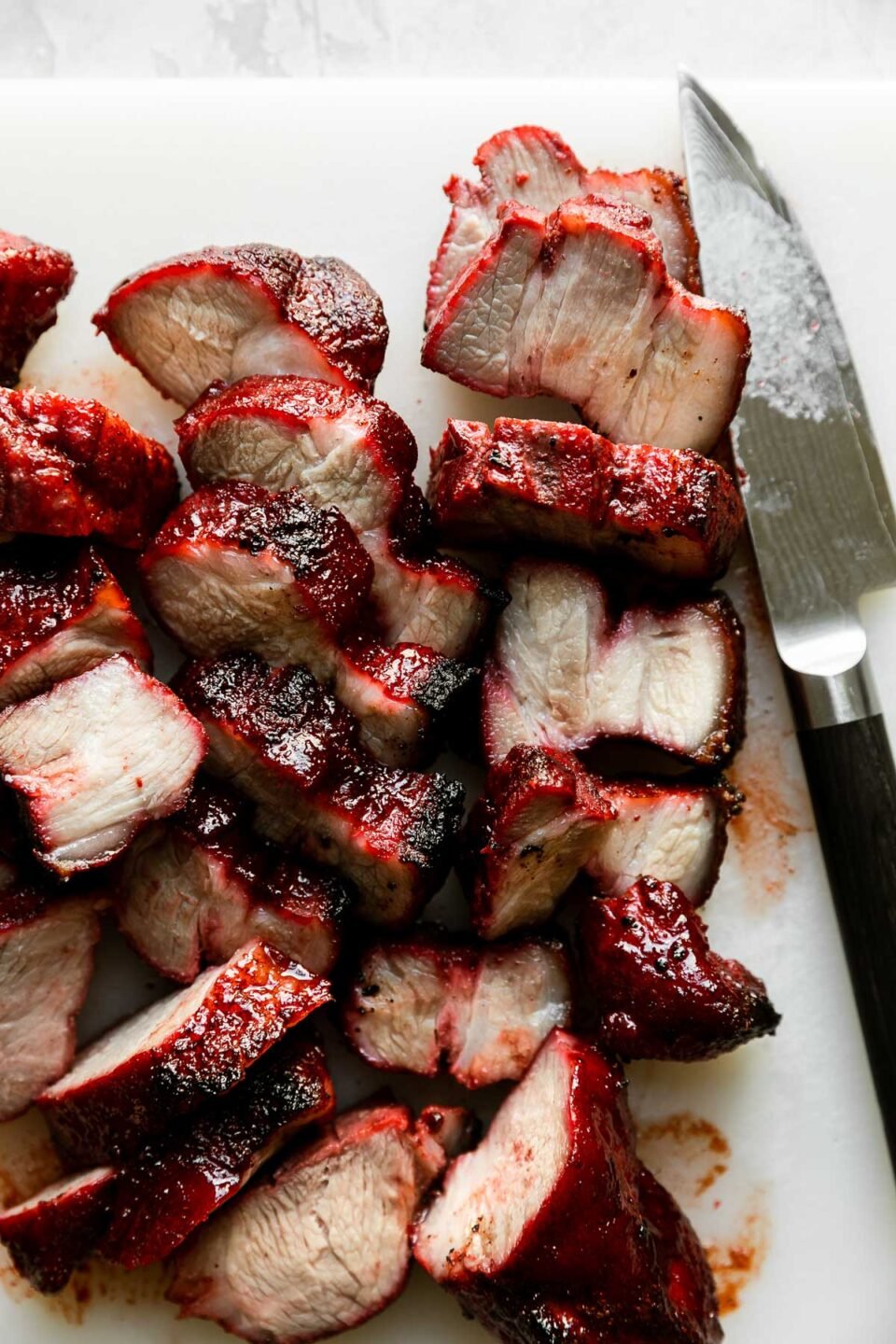
What is Char Siu?
Char siu is an iconic Chinese (specifically, Cantonese) roasted BBQ pork. Signature to char siu is a deep, uniquely sweet-savory-spiced flavor, which is a result of char siu sauce – a marinade typically made with Chinese five spice, soy sauce &/or hoisin sauce, & a sweetener like honey or maltose.
Char siu literally means “fork roasted” because the marinated pork is traditionally skewered on long forks & roasted over an open fire or vertically in an oven. Hearty cuts, like pork shoulder or pork butt, are often used to make char siu, as they stand up to roasting very well, however you can use leaner cuts like pork loin or pork tenderloin. The meat is basted with even more char siu sauce as it roasts, allowing the heat to caramelize the sugars & give the juicy Chinese BBQ pork a crave-worthy crisp finish.
Char siu pork is probably most easily recognized by its vibrant red color & shiny glaze. Traditional recipes use red bean curd or ground red yeast powder in the marinade, giving the roasted pork a natural red hue. Red food coloring is often used as a quick shortcut in homemade versions, this recipe included. If you prefer, you can totally skip the red coloring – your char siu pork will still have amazing flavor!
The Easiest Marinade for Sweet & Sticky Char Siu
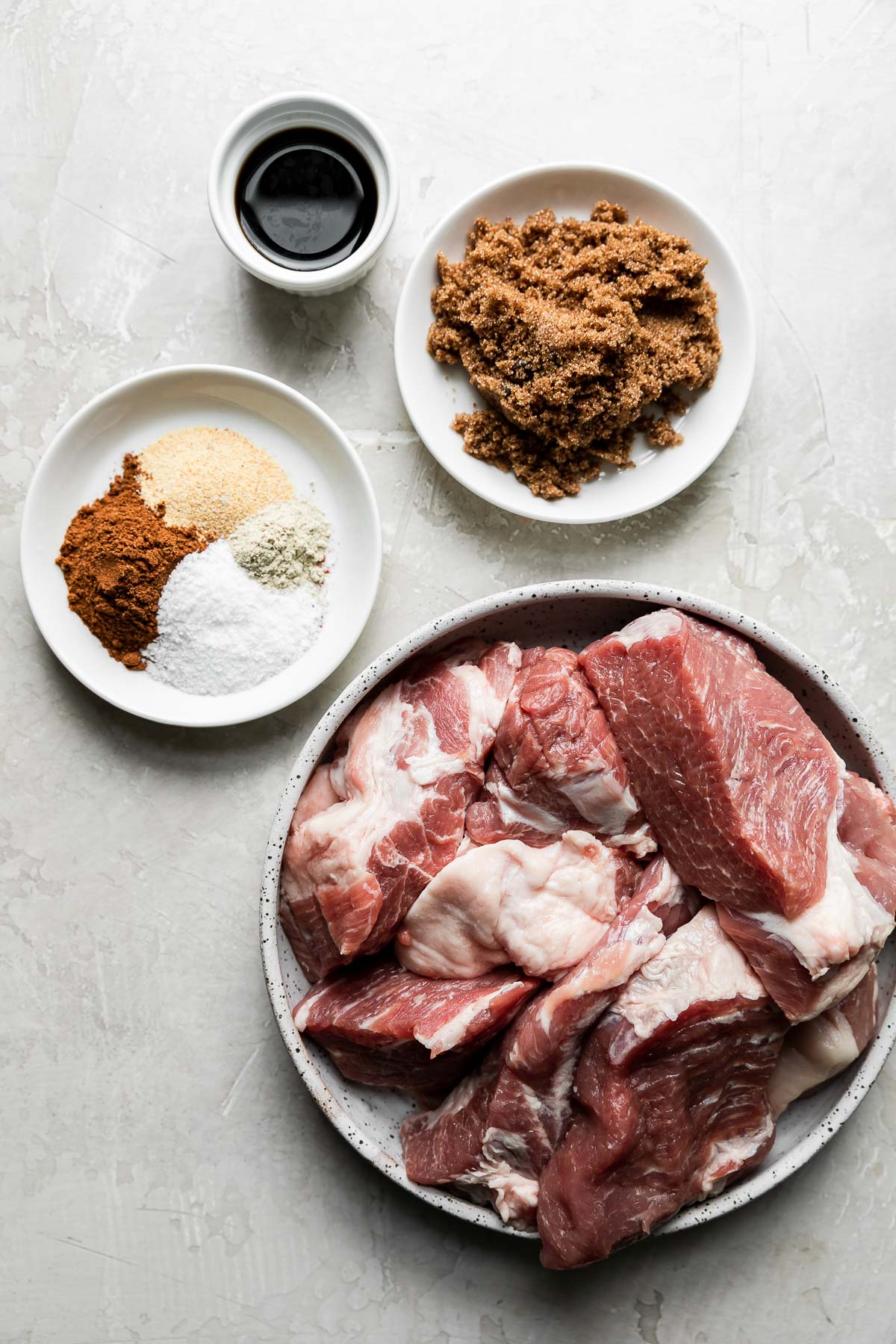
Note: Full ingredients list & measurements provided in the Recipe Card, below.
This char siu marinade uses 4 key ingredients to create the perfect sticky-sweet texture & flavor. All you need is some soy sauce, dark brown sugar, Chinese five spice, & garlic powder – it truly could not be easier to whisk together! As a 5th optional ingredient, add in a little red liquid food coloring if you’re aiming for an iconic red char siu glaze.
Chinese Five Spice
An important element of the char siu marinade is Chinese five spice, a warm spice blend commonly used in Asian-inspired cooking. It gives the BBQ pork a subtle spice to balance the savory sweetness in the marinade.
A Chinese five spice blend typically includes cinnamon, cloves, fennel seeds, & star anise with other ingredients like Sichuan peppercorns, ginger, & black pepper sometimes added to the mix. It’s common for the spices in a Chinese five spice to vary – sometimes they’re even made with more or less than five spices!
My go-to Chinese five spice is Simply Organic’s Five Spice Powder.
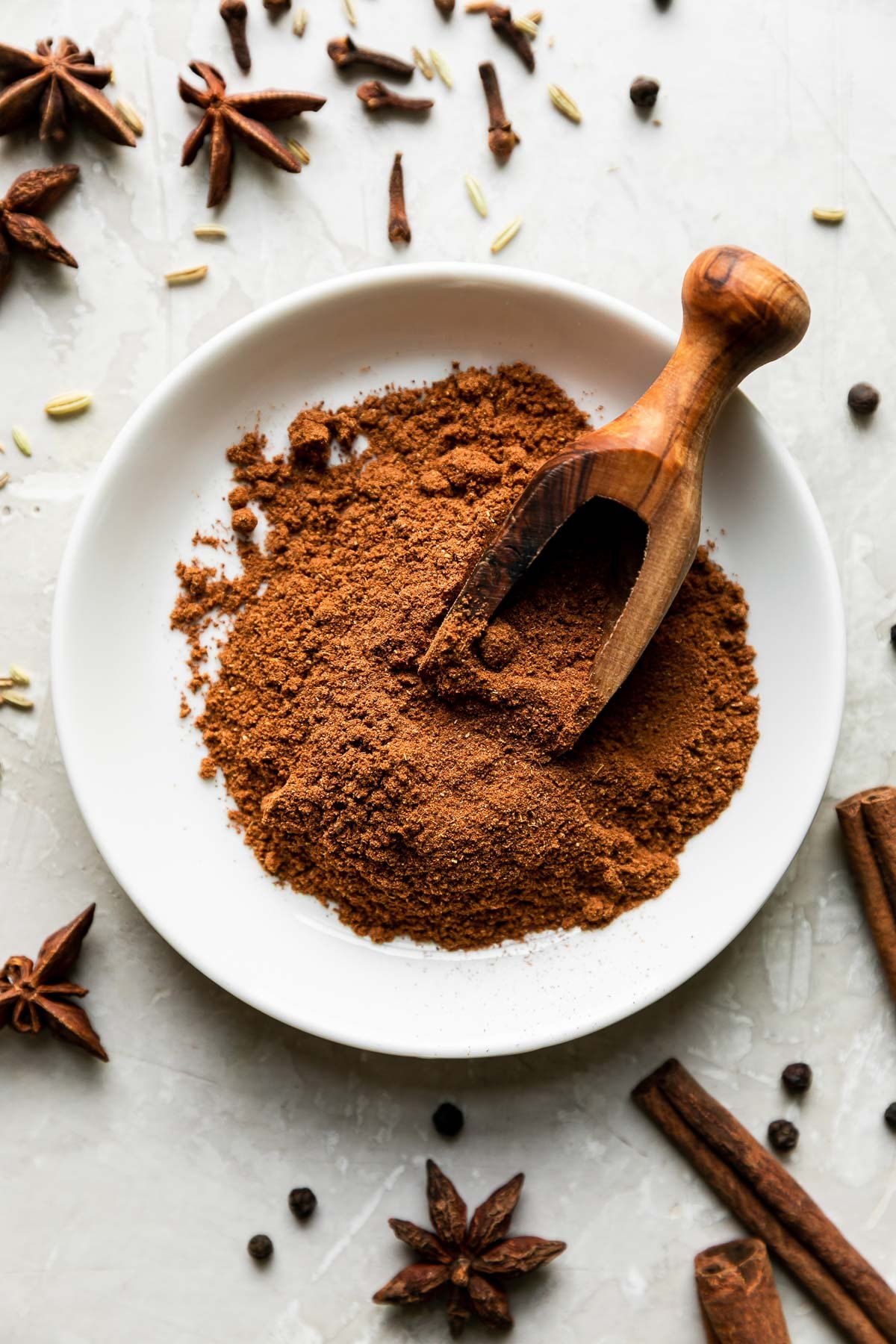
A few quick notes:
- The use of brown sugar in this recipe is where my mom’s marinade is a tad more Hawaiian-style than Chinese. Other Chinese BBQ pork recipes get sweetness through honey or maltose, but my family loves using dark brown sugar to make savory-sweet Asian-inspired meals. When tested against honey, I found dark brown sugar created a thicker char siu glaze with richer flavor…so I’m sticking with Mom’s version here!
- How to make gluten-free char siu. ⇢ Simply substitute soy sauce with tamari. Most brands of tamari are made only with fermented soy & do not include wheat or other grains like soy sauce.
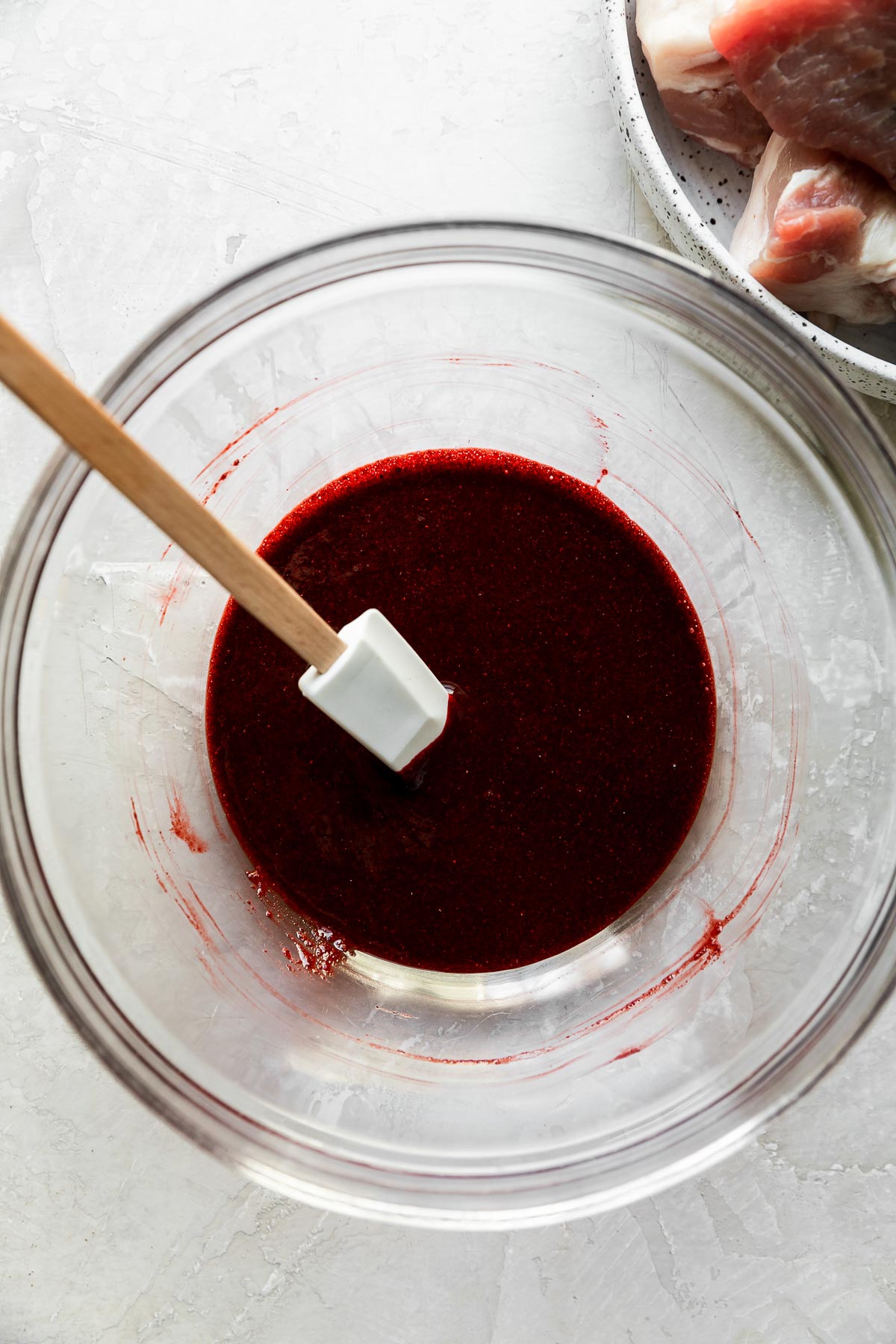
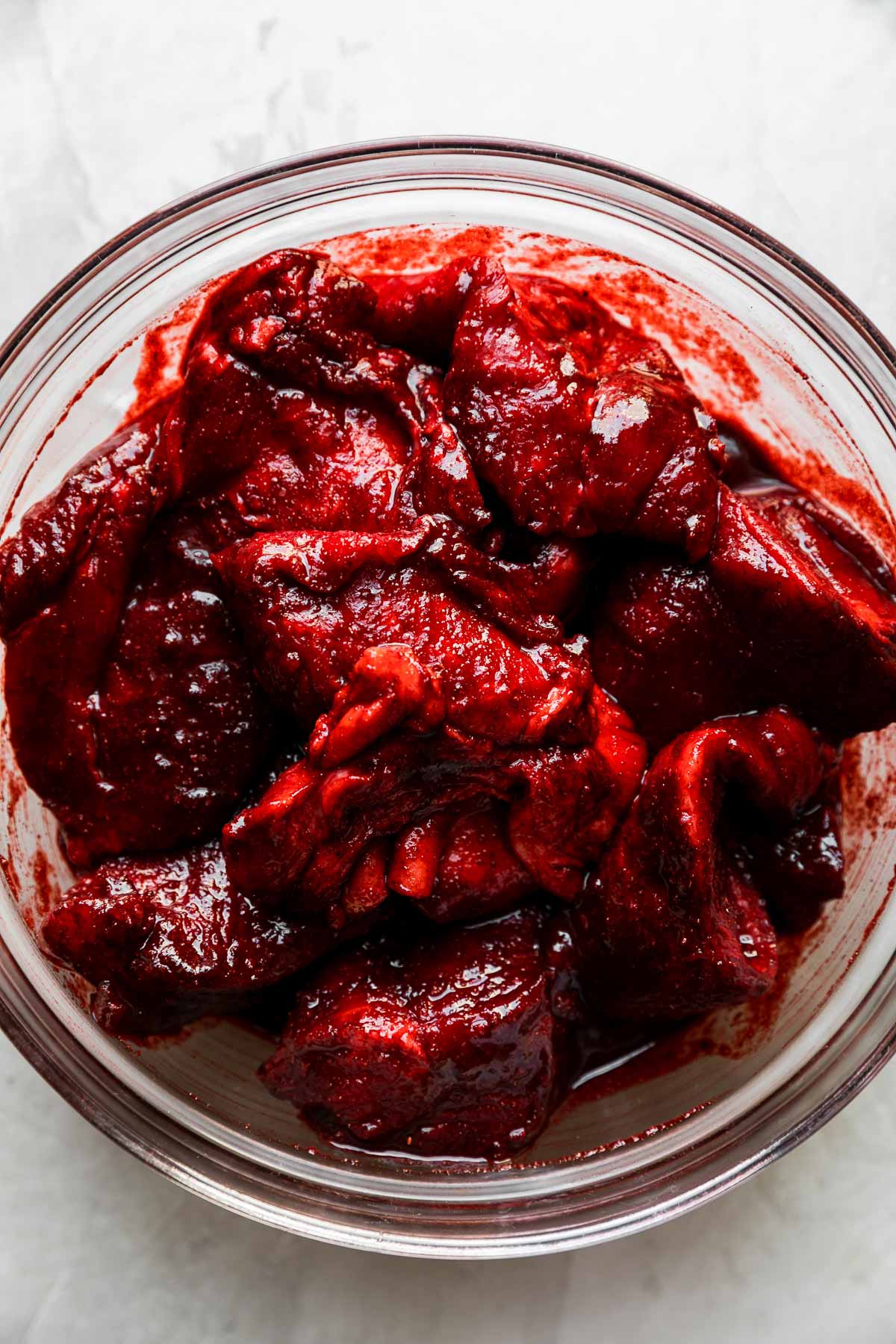
Full Recipe Directions, including step-by-step photos, are included in the Recipe Card, below.
Suggested Marinating Time
Marinate the pork for at least 12 hours or up to 3 days. The longer the better here – the more the meat soaks up the marinade, the more flavorful your char siu pork will be! I like to use a large airtight container or resealable plastic bag for marinating, just be sure to toss & coat well so the meat is well-flavored.
Important Char Siu Tip!
Be sure to reserve some marinade for basting! I recommend using about 3/4 of the char siu marinade to soak the pork & saving the rest for the roasting process. Basting the pork with extra marinade as it roasts is essential to creating the classic glossy finish signature to Chinese BBQ pork.
Shop Our Favorites!
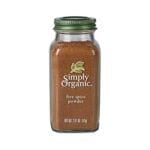 Buy Now →
Buy Now → 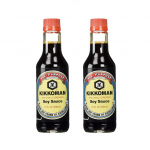 Buy Now →
Buy Now → 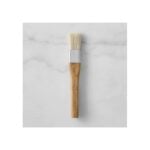 Buy Now →
Buy Now → How to Roast Chinese-Style BBQ Pork
Once it has sat in the marinade, roasting Chinese-style BBQ pork at home is very simple – the oven does all of the work!
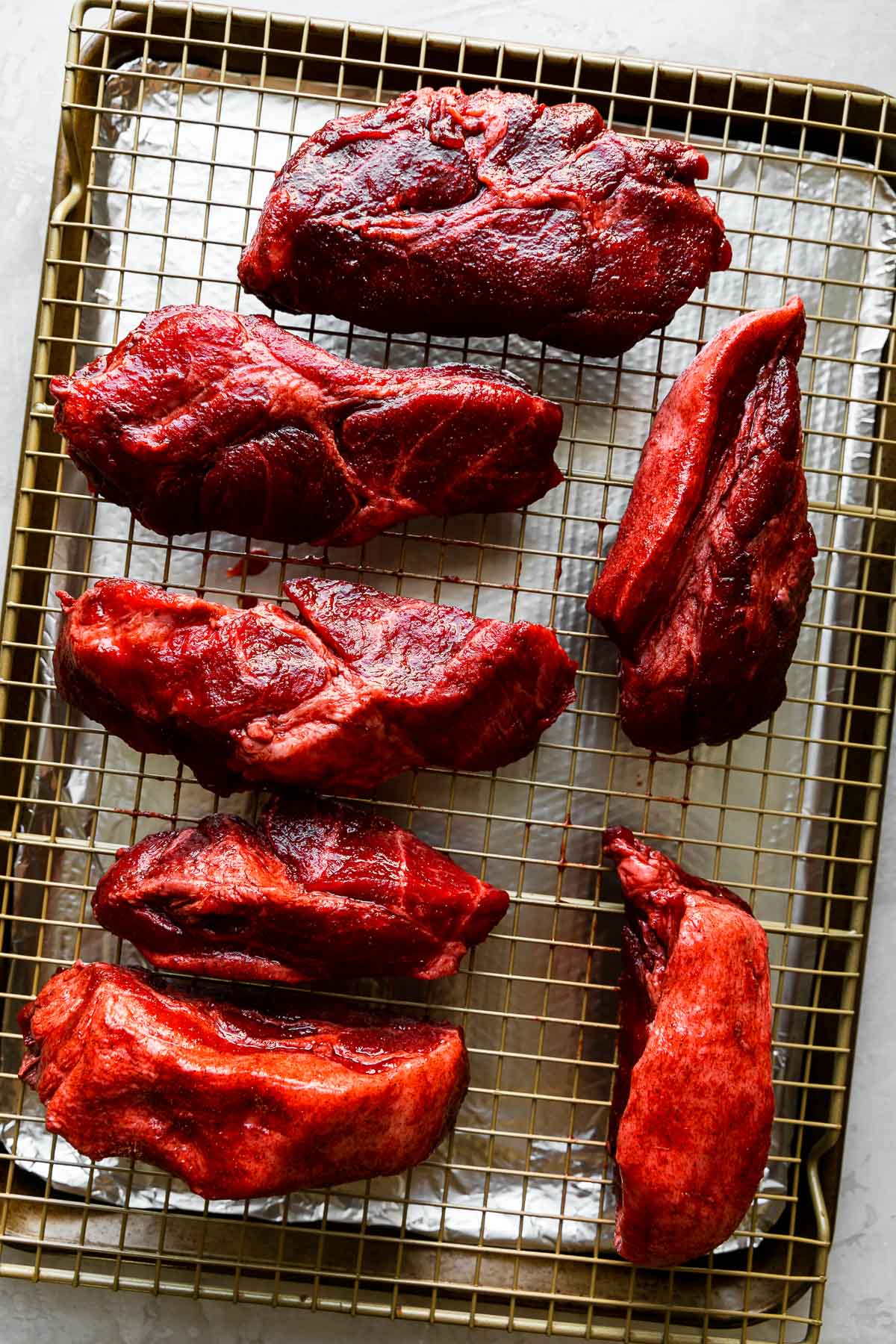
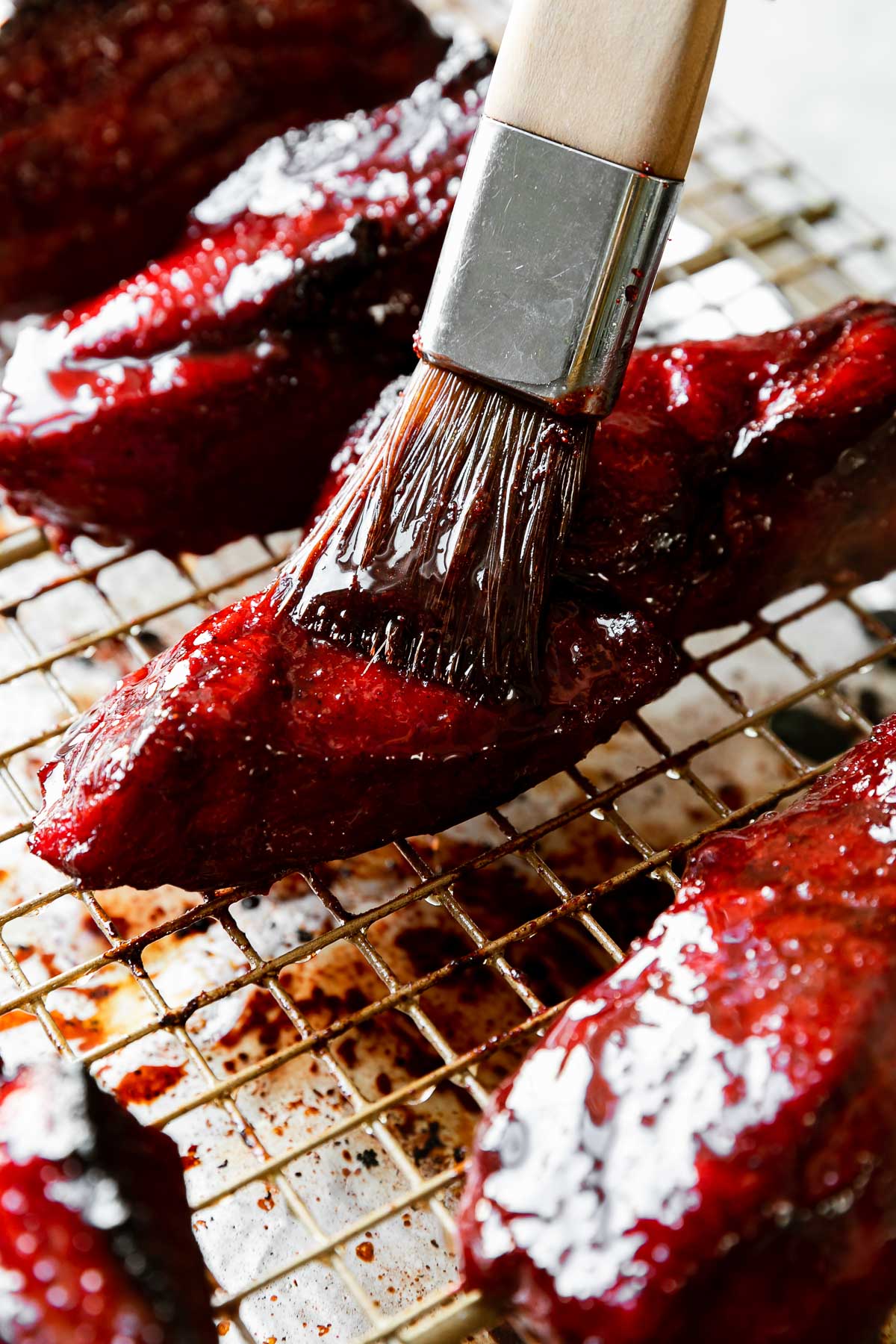
Full Recipe Directions, including step-by-step photos, are included in the Recipe Card, below.
Prep for roasting. Pull the marinated pork out of the refrigerator about 30 minutes before you’re ready to roast it. Bringing it up to room temperature is key to ensuring a more even cook. Transfer the marinated pork to a wire rack positioned over a sheet pan. Why? ⇢ Roasting the meat on the elevated rack allows air to circulate around the meat as it roasts. This helps it cook more evenly & is an easy way to simulate the traditional Chinese “fork roasted” method.
Roast & baste the char siu pork. Roast the pork for 30 minutes, basting the meat every 15 minutes. To baste, take the reserved marinade & whisk in a little of hot water. When the time comes, generously brush the liquid all over the surface of the char siu pork. Why? ⇢ Basting the pork as it roasts gives the char siu its classic, thick, sticky-sweet glaze. Definitely don’t skip this step! You’ll know the char siu is ready once the edges of the pork begin to caramelize from the sugar in the marinade.
Optional: Finish the char siu under the broiler. Finishing under the broiler creates charred, smoky caramelized edges that are absolutely crave-worthy. To do so, place the char siu under the high setting of your broiler & cook until the pork reaches your desired caramelization. This can happen quickly, so keep a close eye on the char siu to ensure it doesn’t burn!
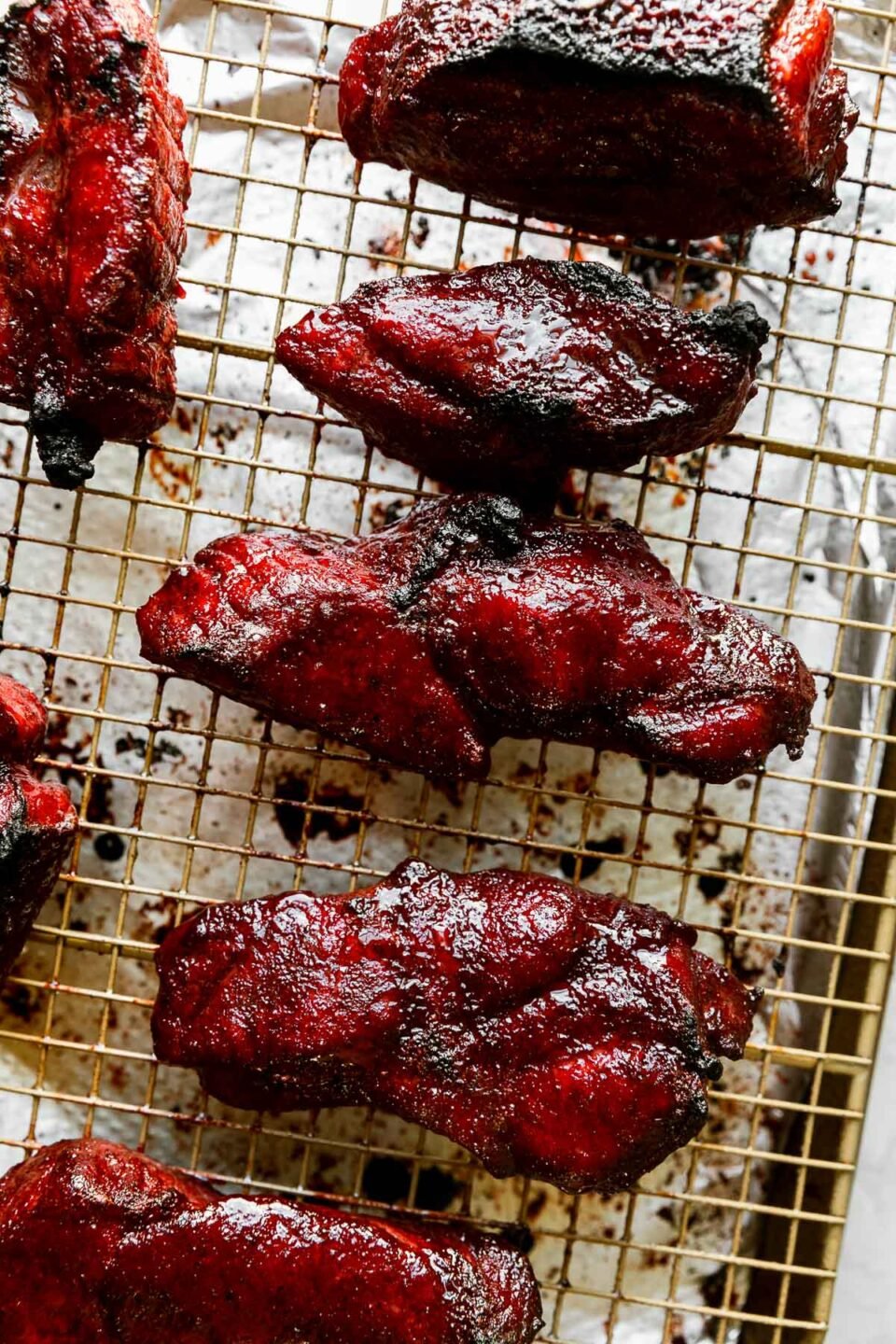
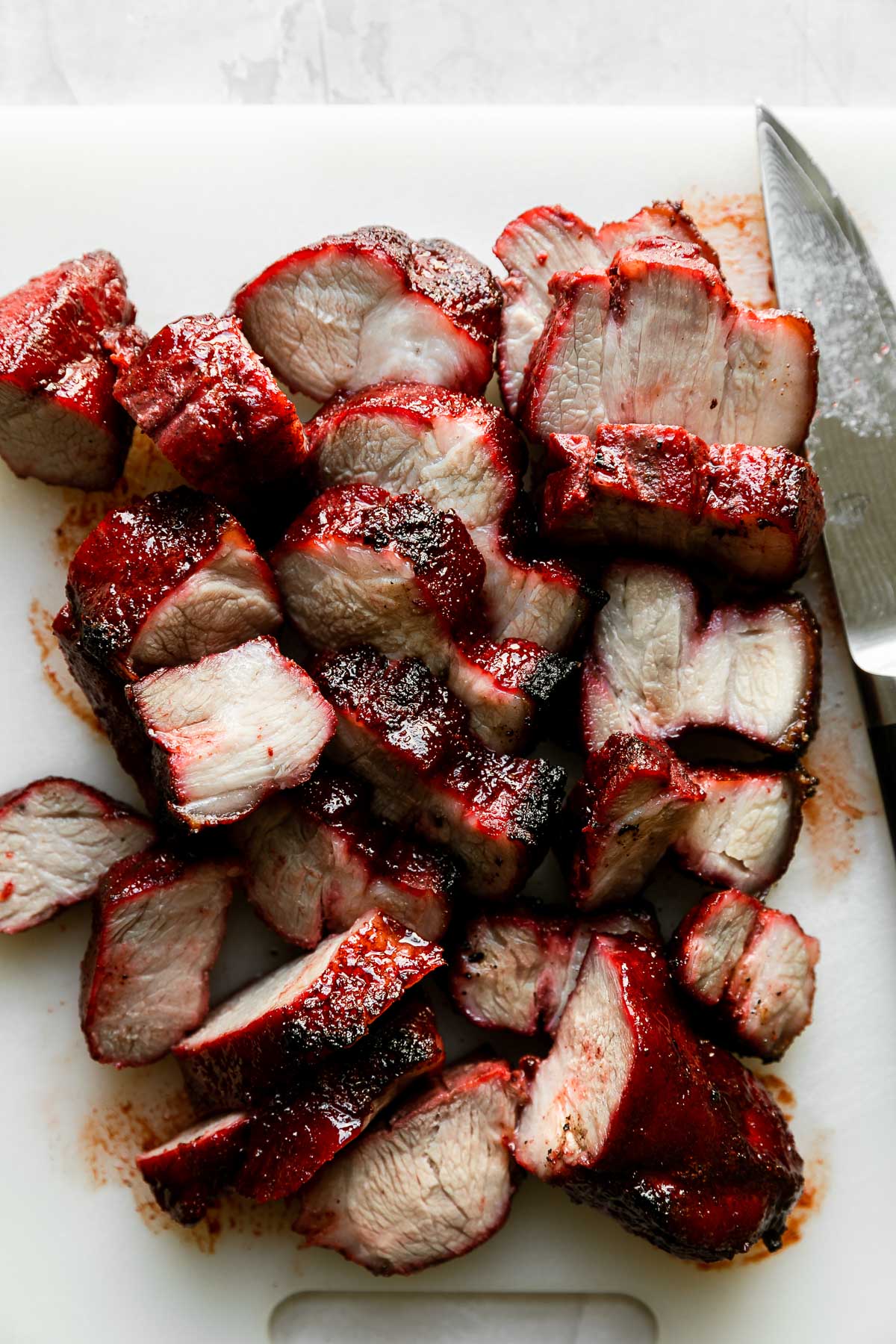
Serving Char Siu Pork (The Options Are Endless!)
One of the reasons why I love this pork so much is because it’s endlessly versatile.
Our Go-To – Char Siu Rice Bowls! ⇢ Since it’s flavorful enough to stand on its own as a meal, my family likes to slice roasted Chinese BBQ pork into half-inch thick pieces & serve over rice with a quick & easy roasted broccoli or sautéed bok choy. It’s simple-yet-delicious goodness – so comforting!
There are also plenty of other ways to enjoy char siu, though, including…
- Tossed into fried rice or stir fry. Add some sliced or diced char siu pork into your favorite rice or noodle stir fry to make a complete meal! It’s a great add-in for Pork Chow Fun, one of my all-time favorite Hawaiian-style comfort foods.
- Tucked into bao buns. Pillowy-soft steamed buns are the perfect vessel for sticky-sweet char siu. Tuck the pork into bao & top with sesame seeds & sliced scallions. Or, try our favorite manapua, the Hawaiian equivalent to Chinese char siu bao.
- Nestled in a bowl of ramen or saimin. A hot bowl of noodles is that much better with a bit of char siu. Add the BBQ pork on top of your ramen or nestle into a bowl of saimin, an amazing Hawaiian noodle soup often served with char siu.
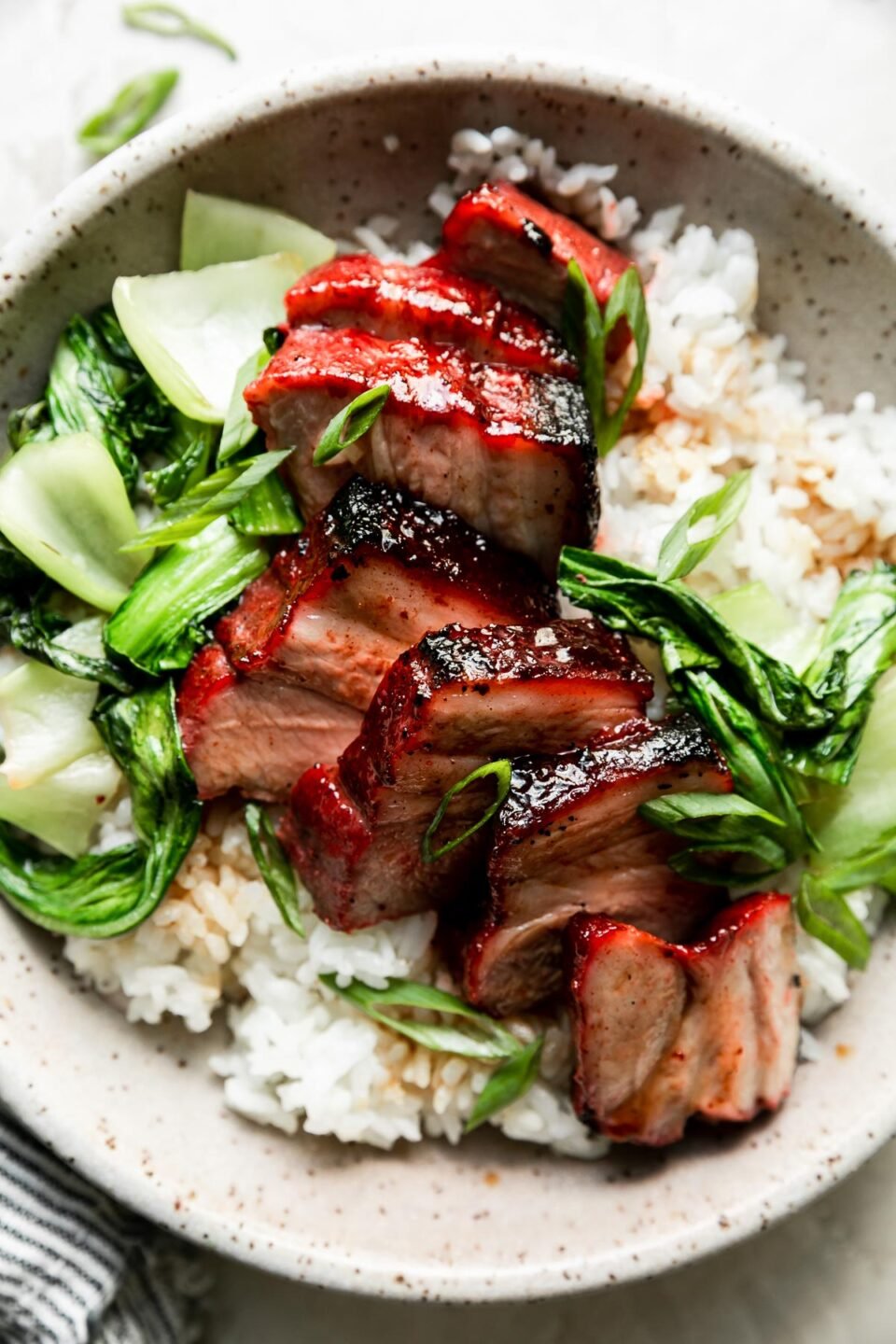
I can’t wait for you to try this Easy Homemade Char Siu recipe! It’s perfectly savory-sweet & you can use it in about a billion different ways – I know you’ll love it as much as my family does! If you do give it a try, be sure to let me know! Leave a comment with a star rating below. You can also snap a photo & tag @playswellwithbutter on Instagram. I LOVE hearing about & seeing your PWWB creations! ♡ Happy cooking!
More Recipes Like This:
Asian-Inspired Flavors

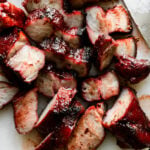
Easy Homemade Char Siu (Roasted Chinese BBQ Pork)
- Prep Time: 15 minutes
- Marinating Time: 12-48 hours
- Cook Time: 35 minutes
- Total Time: 50 minutes
- Yield: serves 4-6 1x
- Category: Main Dishes, Pork Recipes
- Method: Roasted, Oven
- Cuisine: Chinese, Asian-Inspired, Hawaiian
Description
Char siu, iconic vibrantly red roasted Chinese BBQ pork, is one of my all-time favorite meals. This particular homemade version is the one my mom made all the time throughout my childhood – it’s truly a treasured family recipe & we’re thrilled to share it with you.
It starts with a char siu marinade, which creates the signature spiced-sweet-savory flavor. Despite the fact that it’s super rich & complex in flavor, our char siu marinade is made with just 4 simple staple ingredients: soy sauce, dark brown sugar, garlic, & Chinese five spice. If you’re after the signature red color, you can add in a few drops of red food coloring, too.
From there, it simply roasts in the oven until the BBQ pork is juicy & tender, with a slight crisp-caramelization around the edges. To take it one step further, we like to finish the pork under the broiler, which is a simple way to emulate traditional Chinese ‘fork roasted’ flavor at home.
Char siu pork is endlessly versatile – serve over a comforting pile of rice or use as a flavorful add-in to stir-fried noodles, steamed bao buns or baked manapua, fried rice, & more!
Ingredients
- 2 pounds boneless pork shoulder, sliced into 1-inch wide strips
- 1/4 cup dark brown sugar (can sub regular brown sugar if needed)
- 2 tablespoons soy sauce (can sub tamari if gluten-free)
- 2 teaspoons Chinese five spice
- 1 teaspoon garlic powder
- optional: 1/4 teaspoon red liquid food coloring
- kosher salt & ground white pepper, to season
Instructions
- Prepare the char siu marinade: In a small bowl, combine the dark brown sugar, soy sauce, Chinese five spice, garlic powder, & red food coloring (if using). Season with 2 teaspoons kosher salt & 1/4 teaspoon ground white pepper. Whisk to combine well. Transfer 1/4 of the marinade to a small airtight container or jar & reserve for basting the roasted pork.
- Marinate the pork: Place the pork shoulder in a large airtight container or resealable plastic bag & pour the remaining 3/4 of the char siu marinade over top. Toss to combine, coating the pork in the char siu marinade well. Cover/seal & transfer to the refrigerator to marinate for at least 12 hours or up to 3 days. The longer you’re able to marinade, the more flavorful the char siu pork.
- Roasting prep: About 30 minutes before you’re ready to roast, pull the pork out of the refrigerator to come to room temperature for more even cooking. Preheat the oven to 425 degrees F, ensuring one oven rack is positioned in the center of the oven & a second oven rack is positioned directly under the broiler. Line a rimmed baking sheet with parchment or foil for easy clean up as desired. Lightly spray a wire rack with cooking spray & set it in the baking sheet. Transfer the char siu marinated pork to the prepared wire rack, shaking off & discarding any excess marinade.
- Roast the char siu pork: Place the pork in the preheated oven & roast 30 minutes, basting the pork every 15 minutes. To baste, whisk 1 tablespoon hot water into the reserved char siu sauce from Step 1, above. Use a pastry brush or silicone basting brush to generously brush the diluted char siu sauce all over the surface of the pork. The char siu is ready once it begins to caramelize around the edges & reaches an internal temperature of 145 degrees F, about 30 minutes.
- Optional: Finish under the broiler: Preheat your oven’s broiler to its highest setting. Place the roasted char siu under the broiler. Broil 3-4 minutes, rotating the pan halfway through, until the surface of the char siu pork is charred & caramelized as desired – be sure to keep a close eye on it as it broils, as things quickly transition from perfectly caramelized to burnt under the broiler.
- Serve: Allow the roasted char siu to rest for a couple of minutes before slicing & serving. As far as everyday dinners go, my family likes to slice the char siu into 1/2-inch thick pieces & serve it over rice with a quick & easy veggie, like roasted broccoli or sautéed bok choy or cabbage. Roasted char siu is also amazing tucked into steamed buns, nestled in a bowl of ramen or saimin, or tossed into fried rice or stir fry – try our Hawaiian-Style Pork Chow Fun, one of my all-time favorite comfort food meals!
Notes
- Ingredient Notes:
- Pork shoulder is also commonly called Boston butt or pork butt. For best results for homemade char siu, look for a boneless pork shoulder roast with a nice fat cap & good marbling throughout, which translates to richly flavored, super juicy BBQ pork – absolutely delicious!
- Dark brown sugar is one of my family’s favorite pantry ingredients for savory-sweet Asian-inspired meals. Made with a more generous amount of molasses than light brown sugar, dark brown sugar tends to be richer in flavor & yields more caramelly results in marinades & sauces. If you only have light brown sugar on hand, feel free to substitute with regular light brown sugar.
- Chinese Five Spice is a warm spice blend commonly used in Chinese cooking, & it’s a must-have ingredient if you like to cook Chinese-style dishes at home. While the spices can vary in variety & number (sometimes 5 spice blends are made with more or less than 5 spices!), a Five Spice blend typically includes cinnamon, cloves, fennel, & star anise. It’s readily available in Asian grocery stores or in the spice aisle at most conventional grocery stores. My go-to is Simply Organic’s Five Spice Powder.
- Storage & Freezing:
- Storage & Reheating: Leftover char siu will keep, stored in an airtight container in the refrigerator, for up to 5 days. Reheat leftovers in the microwave or on the stovetop until warmed through.
- Freezing Instructions: Because char siu is a great pupu or add-in for stir fries & soups, I like keeping some on hand in my freezer at all times. To freeze, place cooled, sliced bbq pork in a freezer bag, ensuring all of the air is removed from the bag when you seal. Freeze up to 3 months. To thaw, place the frozen char siu in the refrigerator overnight or submerge the freezer bag in room temperature water for a quicker thaw. Easily reheat on the stovetop or in the microwave.
Want More Local-Style Hawaii Recipes? Join Our Email List!
Sign up for the PWWB email list & we’ll send you our FREE Local-Style Hawaii Favorites Email Series straight to your inbox. These recipes are…
- My family’s special recipes – From Mom’s famous Hawaiian Mac salad to my Hawaiian Grandpa’s cozy beef stew these recipes hold a special place in my heart & have become PWWB reader favorites too!
- Easy to make at home – You can now enjoy a true taste of Hawai’i right at home!
- A joy to cook & a joy to eat. – The next best thing to visiting the islands yourself. 🌺
Plus, we’ll keep you in the loop by sharing every NEW recipe as soon as they go live on Plays Well With Butter – all delivered straight to your inbox!
Recipe and Food Styling by Jess Larson, Plays Well With Butter | Photography by Rachel Cook, Half Acre House.
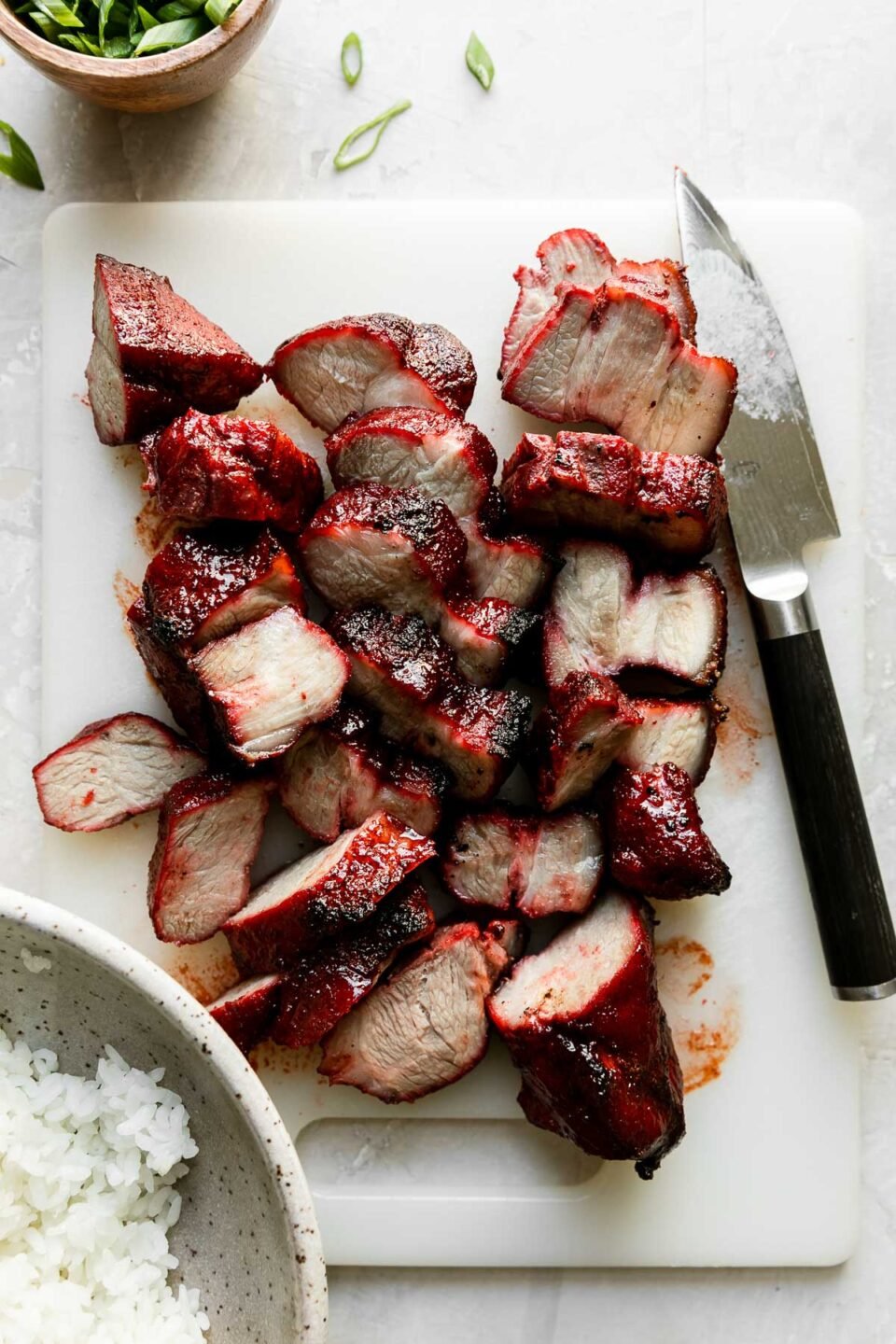
Follow along with Plays Well With Butter on Instagram, YouTube, Facebook, and Pinterest for more unfussy recipes that pack a big punch of flavor!


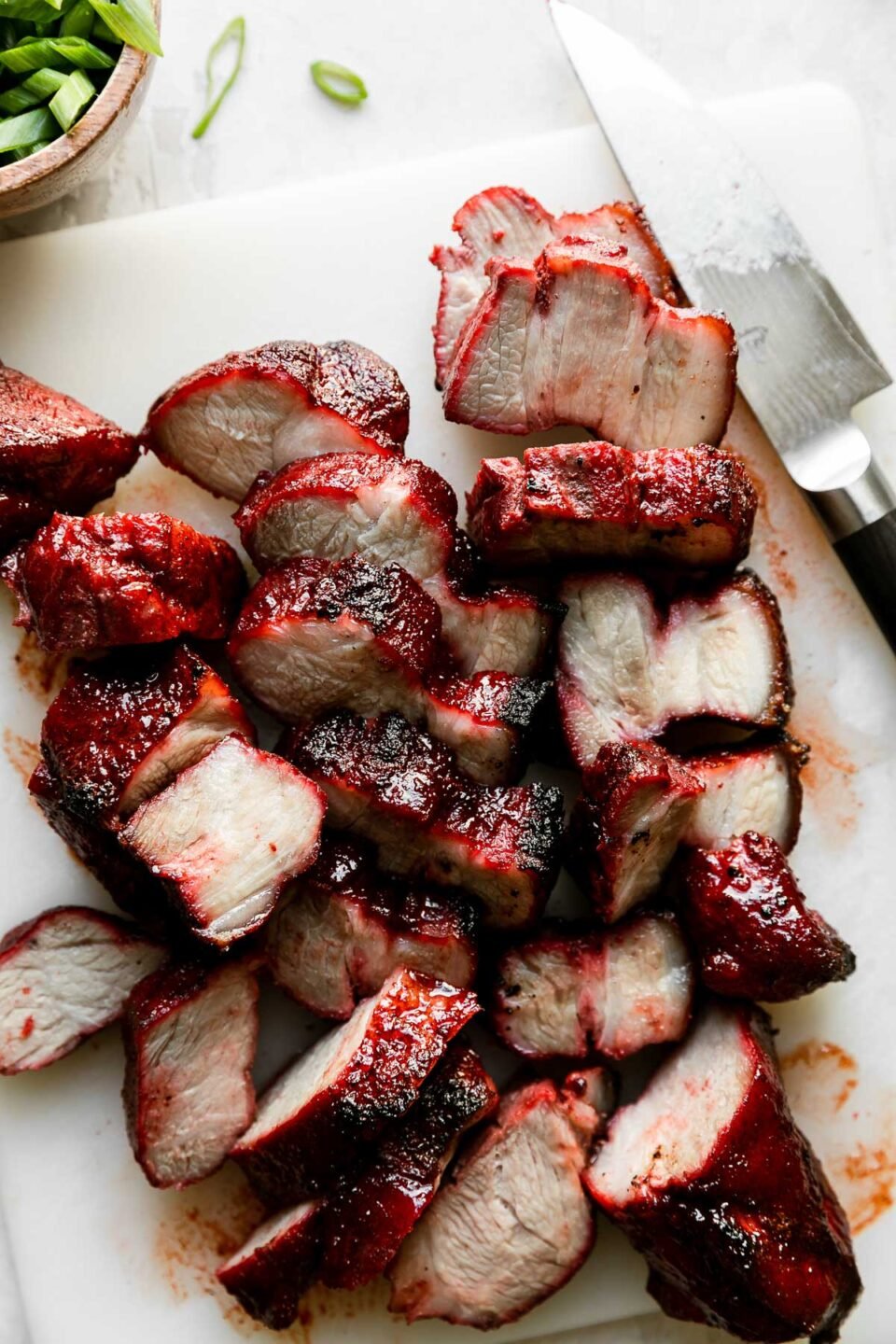
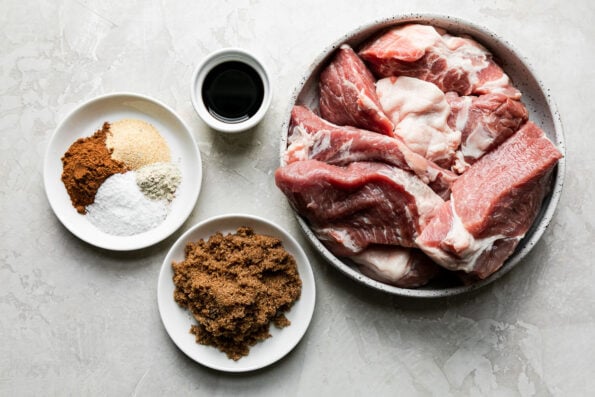
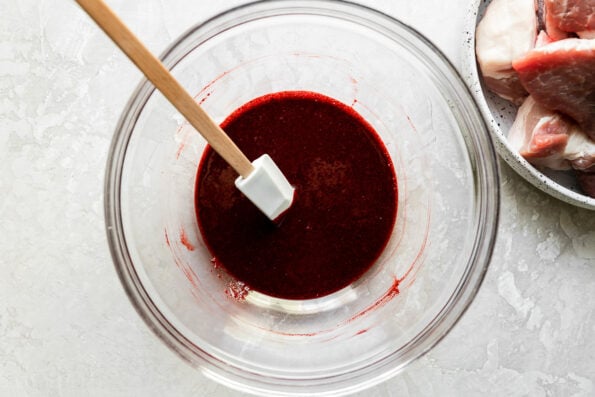
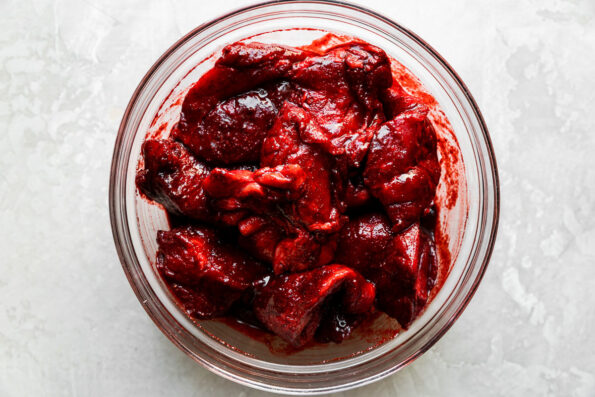
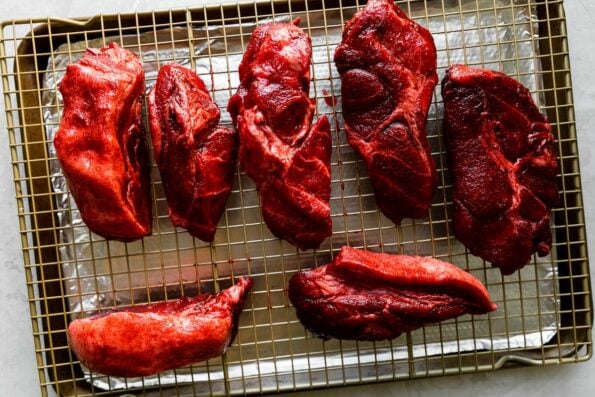
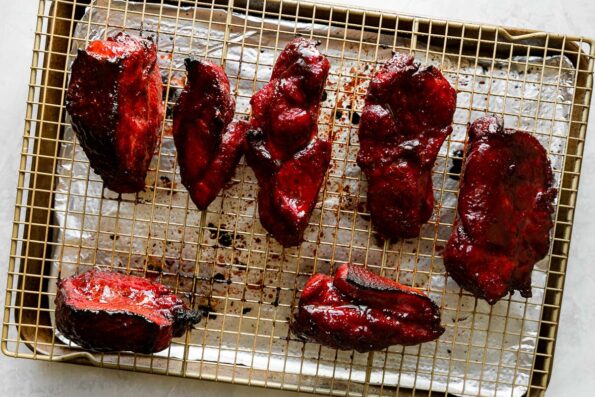
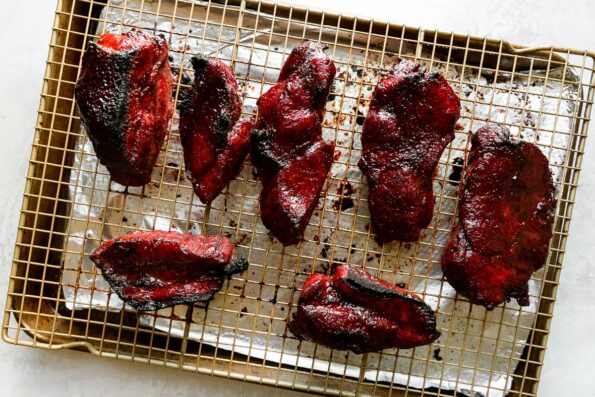
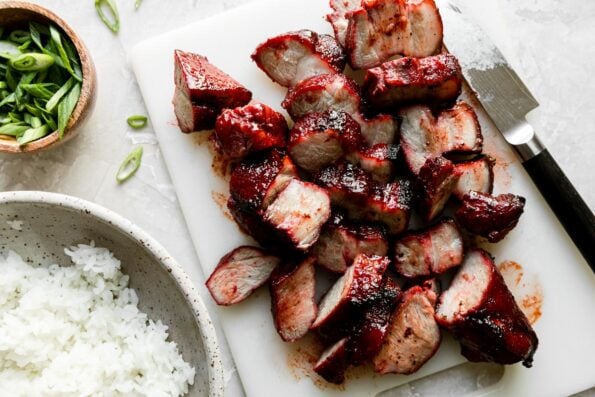
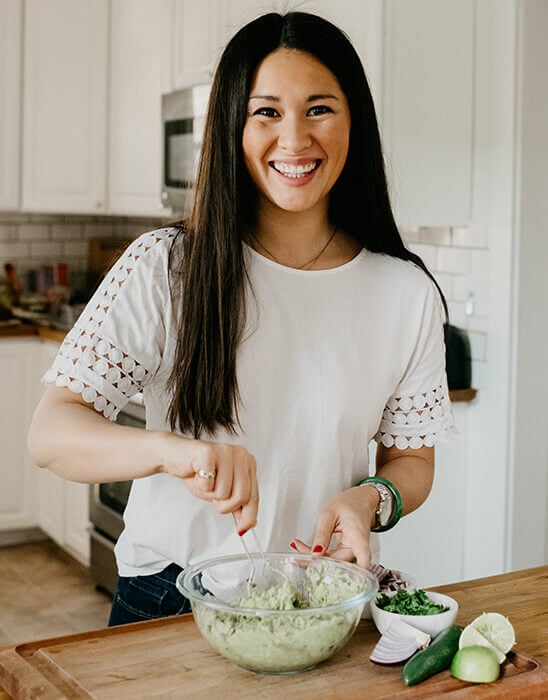
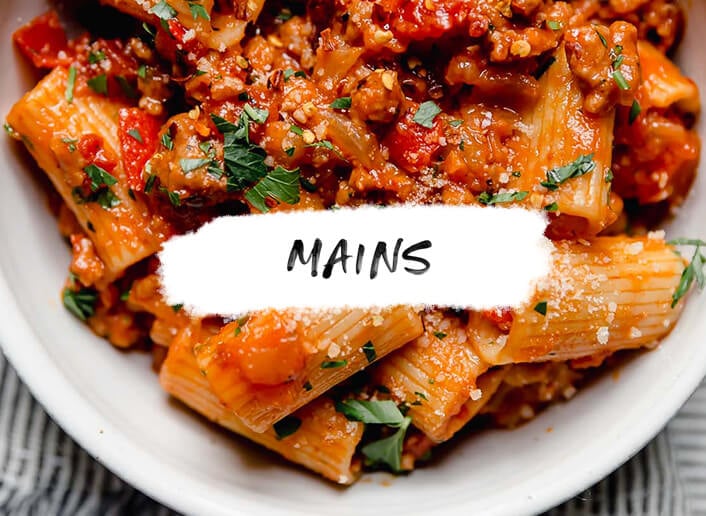
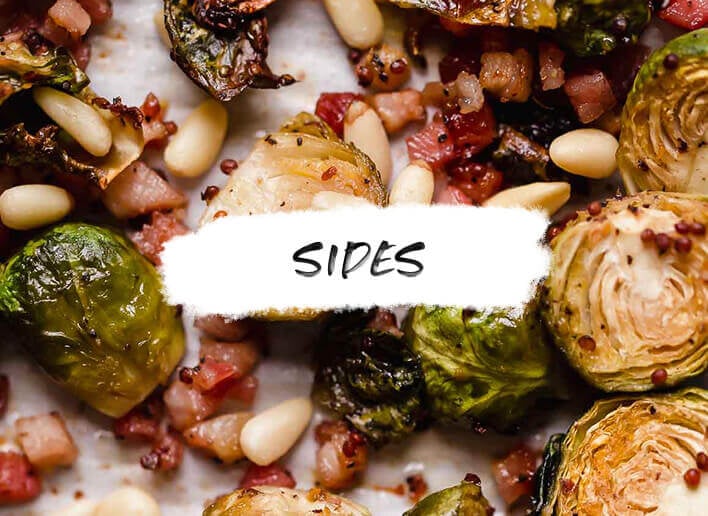


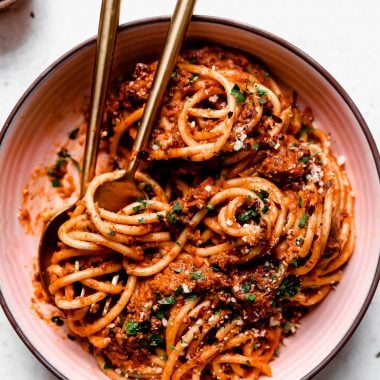
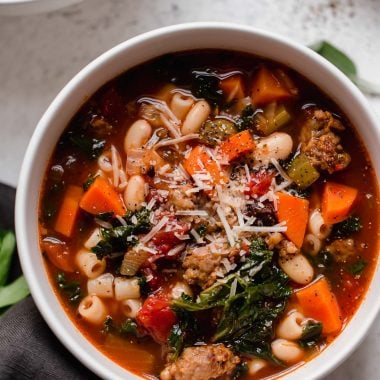
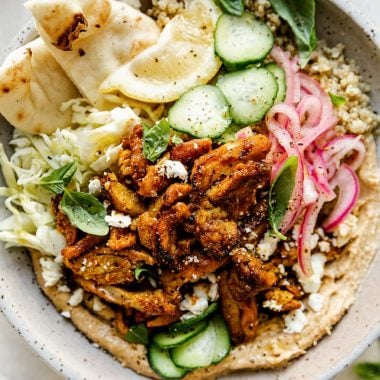
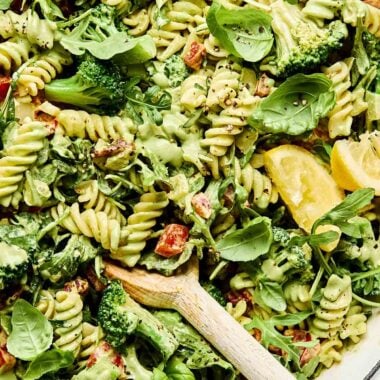


This is the second pork recipe that I have tried this week from your site. My husband said that this was the best thing that has been made in our kitchen in a long time! My whole family loved it (4 kids from ages 5-16). It tasted very authentic and was easy to prepare. I did use brown sugar with monkfruit to cut down on the sugar and it was still amazing. Thanks for the wonderful recipes on your site!
This is divine! I followed the recipe 100%, marinated for 3 days (went slightly over), and had a 8lb roast all carved up. I’m meal prepping char sui buns and sliced char sui for quick reheating. I’ve added this recipe to my favorites, it’s so good! Thank you for sharing!
Hi Haley, thank you so much for the great review! We’re so happy to hear you loved the Char Siu as much as we do 🙂
Could you use boneless country pork ribs for this recipe?
Hi Angie! Thanks for reaching out – we’ve never tested with boneless country pork ribs but you could certainly give it a try. Country style pork ribs are actually cuts of pork shoulder with lots of marbling of fat. This type of cut can benefit from cooking low & slow until tender.
That being said, you could marinate this cut in the char siu marinade but may need to adjust both the oven temperature & cooking time. Let us know if you give it a try!
The minimal amount of ingredients and simplicity of the recipe made this a winner in our household! One just has to plan ahead! Even without the red food coloring, the outside of the pork had an appetizing brown-red crust. The only change I would make next time is to use the thermometer to check the internal temp prior to the 30 minute mark because the pork came out slightly dry. Taste great room temp or even cold.
Hi there! So glad you enjoyed this char siu recipe, thanks so much for leaving a comment! Check out our Char Siu Chicken recipeChar Siu Chicken next! 🙂
Can you substitute pork belly for the oil butt?
Can you substitute pork belly for the pork butt.
Hi Samantha! Thanks for reaching out – we’ve never tested an alternative cut of pork with this recipe so we can’t say for sure! Pork belly & pork butt/shoulder are taken from different parts of the animal and the meat of the belly is much softer & fattier than the heartier butt/shoulder cut. While pork belly can be roasted in certain recipes it can also be more easily overcooked when roasted which can yield a rubbery texture while pork butt/shoulder, on the other hand, roasts really well since it has more muscle & marbling keeping the final dish nice & juicy. If you are looking to swap pork butt/shoulder for another pork cut we’d recommend opting for a pork loin or pork tenderloin instead! Let us know how it goes!
Hi Samantha! Thanks for reaching out – we’ve never tested an alternative cut of pork with this recipe so we can’t say for sure! Pork belly & pork butt/shoulder are taken from different parts of the animal and the meat of the belly is much softer & fattier than the heartier butt/shoulder cut. While pork belly can be roasted in certain recipes it can also be more easily overcooked when roasted which can yield a rubbery texture while pork butt/shoulder, on the other hand, roasts really well since it has more muscle & marbling keeping the final dish nice & juicy. If you are looking to swap pork butt/shoulder for another pork cut we’d recommend opting for a pork loin or pork tenderloin instead!